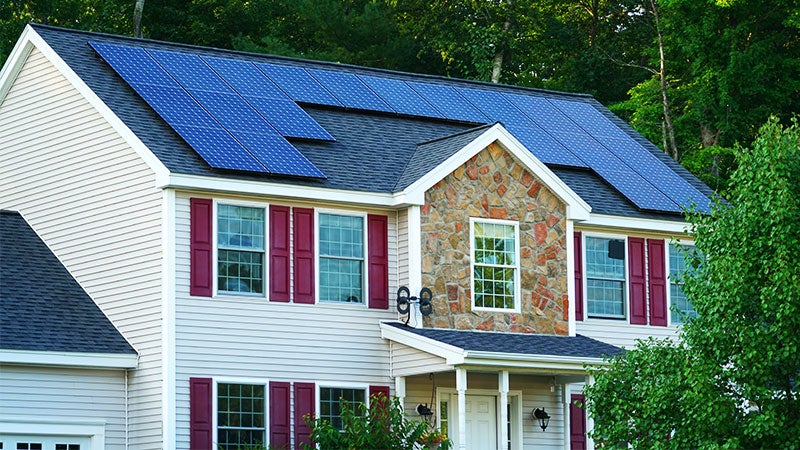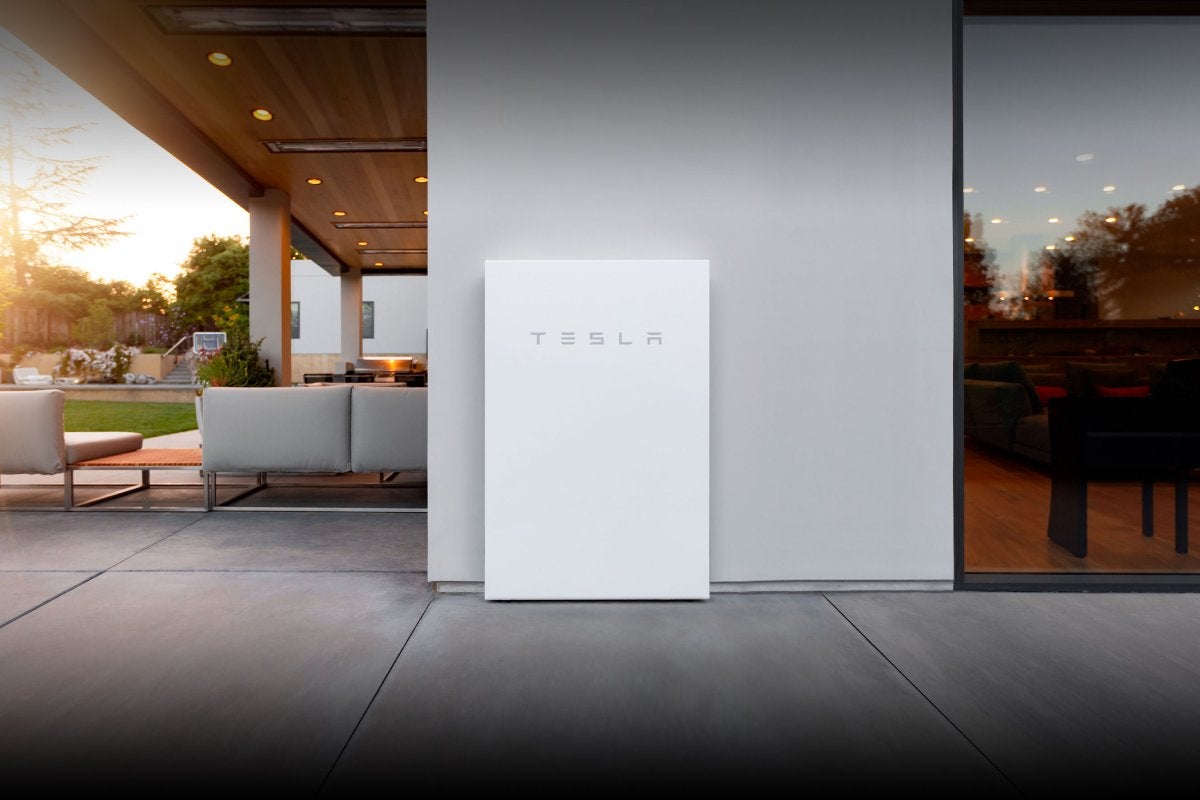Solar Power Purchase Agreement (Solar PPA)

Key takeaways
- Power purchase agreements are a solar financing option with little or no upfront costs.
- You do not own the solar panels in a PPA and are ineligible to claim incentives.
- Powering your home with solar energy could save you money on your electric bill and reduce your carbon footprint.
- PPA contracts can last up to 25 years.
Installing solar panels provides many financial benefits and reduces your home’s carbon footprint, but the upfront costs of solar might turn you away. Fortunately, there are many solar financing options to choose from to work with any budget.
The entire solar installation process can be overwhelming. Picking a company, choosing solar panels, contacting installers and working through tax documents (on top of your everyday life) may cause stress. Power purchase agreements (PPA) are an alternative method for obtaining solar energy without much of the busy work.
Can solar panels save you money?
Interested in understanding the impact solar can have on your home? Enter some basic information below, and we’ll instantly provide a free estimate of your energy savings.
What is a solar power purchase agreement?
A solar power purchase agreement is a contract for solar energy between the user (you) and the supplier (solar developer). Similar to a phone bill where you pay for the data used, and your provider installs and maintains phone lines.
In a solar PPA, you pay the developer for the energy your panels generate. The solar developer is in charge of designing, installing and maintaining your solar panel system. The developer pays for the materials and you pay a monthly fixed rate per kilowatt-hour (kWh) of energy used. Rather than relying on your local utility company to provide your power, you generate your own energy using solar panels and pay the developer for the green energy generated.
Solar PPAs can reduce the financial risks of solar because you are not the owner and not responsible for the upfront costs. Instead, you can enjoy lower energy bills while powering your home with green energy. PPAs may also be a good solar option if you do not have the ability to claim the lucrative incentives or tax credits.
How does a solar power purchase agreement work?
After deciding to go solar through a PPA, you will sign a contract with a developer. Solar panels can last beyond the standard 25-year warranty, so the contracts may extend up to 25 years, too. Similar to other solar processes, design approval, permitting and inspections are all necessary steps before the solar system can be installed. The whole solar installation process can take up to six months, depending on the installer and your local utility.
Instead of relying solely on the traditional electricity grid for your energy, you will use energy generated by the solar system installed on your roof to power your home. A key point to remember is you will be charged for the energy generated, whether you use more or less. The rate usually is less than you would pay for traditional electricity, resulting in immediate savings on your energy bills.
While the solar company is responsible for solar panel upkeep and maintenance, you benefit from using clean energy and a reduced carbon footprint. At the end of your contract, you have the option to extend the PPA, purchase the solar panels at market value, or cancel and have the solar panels removed. Review your contract to evaluate all purchase options and terms.
Solar PPA buyout
Ending or acquiring an existing solar PPA contract is known as a solar PPA buyout. Buyouts may occur in various situations, including:
- Changes in energy needs: If your energy requirements significantly increase or decrease, you might consider a PPA buyout to take ownership of your system and adjust accordingly. This can help you optimize savings and ensure your energy needs are efficiently met.
- Relocation: If you move to a new home or location, you might consider a buyout to terminate the monthly payments of your existing contract. Alternatively, you can find a buyer interested in acquiring your PPA solar contract, allowing you to transfer the agreement.
- Contract renegotiation: If there are changes in regulatory policies or market conditions, you and the solar developer can negotiate a PPA buyout to establish new contract terms that align with the updated circumstances. Renegotiating a solar PPA contract ensures the agreement remains mutually beneficial for you and the solar PPA provider.
It is crucial to thoroughly read and understand the terms and conditions outlined in your original contract before signing. This will help you navigate the buyout process smoothly and make informed decisions about your solar PPA agreement.
Understanding your PPA
You need to be comfortable with the agreement term before you sign a PPA. The rate you pay for solar energy in a PPA may be the same or less than what you might pay for retail electricity. If the expected monthly rate in a PPA is higher than your typical electricity bill, a different solar panel financing option may be a better fit for you to achieve savings.
While contracts may include fixed rates, read the fine print about annual price increases, which are often part of PPAs. Rising inflation and utility operation costs can further impact your savings or break-even point. With fixed rates, you expect the rate to remain the same for the contract length, but agreement details will include information about potential rate increases. Consider asking solar developers or current PPA customers about their experience with rate increases before deciding whether a PPA fits your budget.
Three key entities are involved in a PPA: you (the homeowner), a solar developer and the utility grid. Everyone must agree to the terms of the PPA before solar can be installed and activated.
Solar developer
The solar developer is responsible for designing, coordinating, building and maintaining the solar panels. They pay the upfront costs and own the panels. The solar PPA provider will also receive the financial benefits from solar incentives. Solar developers profit from selling you solar energy, as well as claiming renewable energy credits and incentives — including the 30 percent federal solar tax credit.
Homeowner
As the homeowner, you provide a location for developers to install solar panels to power your home. You do not own the panels but you pay a fixed rate for the kWh of energy generated. The rates are usually lower than retail electricity rates, saving you money on energy costs. However, you are responsible for the the generated cost. If you use less energy than the system generates, you may be overpaying for electricity. Ask your installer how net metering benefits work in your PPA contract.
Utility grid
Many states require solar systems to stay connected to the grid. You will still have power when your solar panels produce less energy, like at night or in winter. Excess energy generated by the solar systems, without an optional battery, returns to the utility grid. The solar developer receives any energy credits from solar energy renewable credits (SRECs).
Benefits of a solar power purchase agreement (PPA)
Purchasing a solar system outright is not for every budget, and tax incentives are not beneficial to every homeowner. If you’re searching for another solar option, explore the benefits of a PPA.
- Solar PPAs are an option to avoid expensive upfront solar costs and pay a monthly bill instead of paying for solar panels and other equipment like solar batteries.
- The solar developer is responsible for maintenance for the duration of the contract, so you enjoy hassle-free solar.
- You benefit from eco-friendly energy and lower monthly energy costs.
- Reduce your carbon footprint and support environmental sustainability.
PPA considerations
There are additional factors to consider before entering a PPA. Review the following before signing a contract.
- If the solar system installed does not cover 100 percent of your energy needs, you may end up paying two bills, one to the solar developer and another to your utility.
- Depending on the available incentives in your state, you may have to pay higher property taxes due to solar panel installation.
- You are not the owner of the solar panels, so you can not benefit from tax incentives or rebates.
Solar PPAs can be a solid payment option to go solar without paying hefty upfront costs. However, whether or not you will save on your energy bills is determined by your location, energy usage and existing energy rates. If you find that a solar PPA won’t provide substantial savings for your home, don’t worry. There are viable loan options to pay for panels over time.






